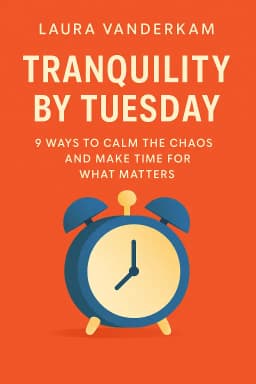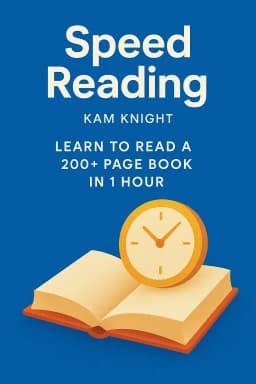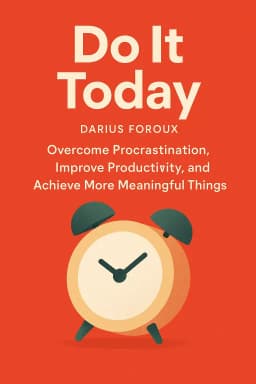
The 5 AM Miracle Meltdown
Golden Hook & Introduction
SECTION
Mark: Research from the University of California, Irvine, shows it takes an average of 23 minutes and 15 seconds to get back on track after a single interruption. Michelle: Wow. That’s half a sitcom. Or a whole power nap. Mark: Exactly. Now, what if the solution isn't just better focus, but building a life where there's almost nothing to be interrupted from in the first place? Michelle: Okay, that sounds both amazing and completely impossible. That’s a bold claim. Where are you going with this? Mark: It’s the central idea behind a fascinating book we're diving into today: The Free-Time Formula by Jeff Sanders. And what makes this book so compelling isn't just the advice, but the story behind it. Michelle: I’m listening. Mark: Well, Jeff Sanders is known as this high-energy productivity guru. He wrote the bestseller The 5 AM Miracle, he’s a plant-based marathon runner, and he’s built a whole brand around dominating your day. He is the last person on Earth you'd expect to write a book about doing less. Michelle: Wait, the "5 AM Miracle" guy? The one who tells everyone to bounce out of bed with extraordinary energy? Mark: The very same. And this book, The Free-Time Formula, was born directly from his own stress-induced, overwork-fueled trip to the emergency room. Michelle: Oh, now that is a story. The productivity coach who productivitied himself into a health crisis. That’s the ultimate irony. What on earth happened?
The Productivity Paradox: Why Hustle Culture Is a Trap
SECTION
Mark: That’s the perfect question, because it gets to the heart of the book's first major idea: the dark side of productivity. Sanders opens with these incredibly raw stories. The foreword is by another productivity expert, Kevin Kruse, who tells this story about working 16-hour days, sleeping under his desk, and being so exhausted he once drove away from a gas station with the nozzle still in his car. Michelle: Whoa. That’s not just burnout, that's a potential explosion. That’s a level of exhaustion where you're a danger to yourself and others. Mark: Precisely. He was living by the mantra "I'll sleep when I'm dead," and he almost got his wish. But Sanders’ own story is even more visceral. He describes a period where he was at the peak of his career—speaking gigs, a new book deal, launching a membership program. He had squeezed every last drop of margin out of his life. Michelle: That sounds like the definition of success in our culture, right? Being in high demand, juggling a million things. Mark: It does, until it isn't. One night, he experiences these terrifying heart attack-like symptoms. His heart is racing, he can't breathe, his chest is tight. His wife calls 911, and he ends up in the emergency room. Michelle: Oh my gosh. And what was it? Mark: The doctor diagnosed it as an esophageal spasm, likely brought on by extreme stress and anxiety. Sanders poses this question in the book that I think everyone can relate to: "How did a guy in his thirties, a productivity coach and marathon runner, find himself so overworked that his own body revolted against him?" Michelle: It’s like his body literally staged a coup against his to-do list. It’s a powerful wake-up call. But what was the root cause? Was it just working too much? Mark: The book argues it's deeper than that. It’s a combination of things. First, what he calls "greed and over-ambition." He had found a good balance the year before, but then he got greedy. He wanted more, so he took on more than he could handle. Michelle: I can see that. That little voice that says, "I can fit one more thing in." Mark: Exactly. And the second thing was the illusion of having multiple "priorities." He points to this fascinating linguistic history of the word 'priority'. For 500 years, from the 1400s, it was a singular word. It meant the single most important thing. It was only in the 1900s that we pluralized it and started talking about "priorities." Michelle: That’s fascinating. And it makes so much sense. You can't have five "first" things. By definition, you can only have one. But my calendar and my boss would disagree. We're all juggling a dozen "#1 priorities." Mark: And that’s the trap. The book argues that when you have multiple priorities, you have no priority. You're just in a constant state of reactive chaos, which is what led him to the ER. His body was sending him the most urgent notification he'd ever received: stop. Michelle: It’s a chilling thought. That the very systems we use to be "productive" are actually the things breaking us down. It’s a paradox. Mark: It is. And it leads to the core argument of the book: "There is a lot we can do to build ourselves up to handle more every day, but there is infinitely more we can do to design a life that operates beautifully on less." Michelle: Okay, so we've established that the hustle is a death trap. It’s a compelling and frankly terrifying diagnosis. But how do we escape? It's one thing to know you're overwhelmed; it's another to actually do something about it. Where does the "formula" part come in?
The 'Nonsense' Audit: How to Reclaim Your Time by Letting Go
SECTION
Mark: This is where the book gets incredibly practical. The next major step is what Sanders calls "Cut the Nonsense." He argues that before you can add anything meaningful to your life, you have to ruthlessly subtract. Michelle: I like that. It’s not about finding a better app or a new planner. It’s about elimination. Mark: Exactly. He defines nonsense as "anything that is a distraction to your vital few goals." And he tells this brilliant story to illustrate the point. After living in an apartment for years, he and his wife bought a house with a yard. The previous owners had neglected the landscaping, and his neighbor was a professional landscaper with a pristine lawn. Michelle: Oh, I know where this is going. The silent pressure of the perfect-lawn neighbor. Mark: You got it. Sanders felt this internal pressure to match his neighbor. He had no experience, but he dove in. He says he spent hundreds of hours mowing, trimming, mulching, planting, weeding... He learned all the tools, he read all the blogs. He significantly improved the yard. Michelle: And I bet he felt really proud of it. Mark: He did, for a moment. And then he had this epiphany. He was standing there, admiring his work, and he realized that maintaining a beautiful yard was not one of his vital few goals. It wasn't even on the list. He had, in his words, "created and solved a problem that never existed." All that time and energy was spent on nonsense. Michelle: That is such a powerful story. It’s like a Marie Kondo for your schedule. If this commitment, this task, this obligation doesn't spark joy—or in this case, directly contribute to a vital goal—you thank it for the lesson and let it go. Mark: That’s a perfect analogy. And it applies to so much more than just yard work. The book pushes you to conduct this "nonsense audit" on everything. He talks about rejecting perfectionism with a "Good Enough" policy. Most projects reach a point of being good enough, and any effort you exert past that point is wasted. Michelle: That’s a tough pill to swallow for high achievers. We're trained to believe that "good enough" is a compromise. Mark: It is. But Sanders reframes it. He says the time you save by stopping at "good enough" is time you can reinvest in your vital goals, where you truly need to excel. It’s a strategic trade-off. Michelle: Okay, that makes sense. What other "nonsense" does he target? Mark: The big one is commitments. He advocates for a "commitment purge." You literally go through your calendar and to-do list and ask of every single item: "Is this nonsense? Does this serve my vital few goals?" If the answer is no, you have to find a way to let it go. Michelle: But saying 'no' is so hard! We're socially and professionally conditioned to say 'yes.' Saying yes makes you seem helpful, competent, a team player. Saying no feels like you're letting people down. Mark: The book acknowledges that. It doesn't pretend it's easy. But it frames saying 'no' as a crucial act of self-preservation and focus. One of the key quotes he uses is from Derek Sivers, who has a "HELL YEAH! or No" philosophy. If you're not emphatically excited about an opportunity, the answer should be no. Because a lukewarm "yes" is just another piece of nonsense cluttering up your life. Michelle: "HELL YEAH! or No." I love that. It’s such a clear filter. It’s not about being rude; it’s about being radically focused on what matters. It forces you to be honest with yourself about your own enthusiasm. Mark: And that's the whole point. It's about designing a life with intention, not by default. You start by understanding the danger of the hustle, and then you get the courage to start cutting away everything that isn't essential. It’s a process of subtraction, not addition.
Synthesis & Takeaways
SECTION
Michelle: So, when you put it all together, the formula isn't really a complex algorithm. It's a fundamental shift in perspective. Mark: Absolutely. It’s a two-step process, really. First, you have to accept the terrifying truth that your busyness, your "productivity," might actually be the biggest obstacle to your success and well-being. You have to see the trap for what it is. Michelle: That's the wake-up call. The ER visit, the gas nozzle incident. It’s the moment you realize the path you're on is unsustainable. Mark: Exactly. And second, once you've had that realization, you have to find the courage to start subtracting. To conduct that "nonsense audit" and let go of the things that are holding you back, even if they feel important or obligatory. Michelle: So the big takeaway for our listeners today isn't to download a new productivity app or buy a fancier planner. It's to pause and ask a really uncomfortable question. Mark: What's that? Michelle: What is one thing I'm doing this week purely out of obligation, not intention? What is the "landscaping" in my life that I'm pouring hours into, that isn't actually one of my vital goals? Mark: That is the perfect question. Maybe it's that recurring weekly meeting that could have been an email. Or spending an extra three hours perfecting a report when "good enough" would have been perfectly fine. It's about identifying that one thing and making a conscious choice to reclaim that time. Michelle: It feels like giving yourself permission to do less, so you can achieve more of what actually counts. It’s a powerful idea. We'd love to hear what "nonsense" you're cutting from your life. Share your thoughts with the Aibrary community. It's a conversation worth having. Mark: It certainly is. Because your free time is your life. It’s too precious to waste on nonsense. Michelle: A perfect place to end. Mark: This is Aibrary, signing off.









